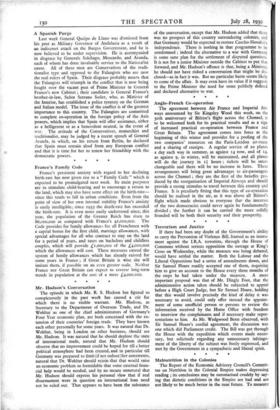Mr. Hudson's Conversation The episode in which Mr. R. S.
Hudson has figured so conspicuously in the past week has caused a stir for which there is no visible warrant. Mr. Hudson, as Secretary to the Department of Overseas Trade, and Dr. Wohltat as one of the chief administrators of Germany's Four Year economic plan, are both concerned with the ex- tension of their countries' foreign trade. They have known each other personally for some years. It was natural that Dr. Wohltat, being in London on other business, should see Mr. Hudson. It was natural that he should deplore the state of international trade, natural that Mr. Hudson should observe that no improvement could be hoped for till a better political atmosphere had been created, and in particular till Germany was prepared to limit (if not reduce)her armaments, natural that Dr. Wohltat should rejoin that that would raise an economic problem so formidable that some external finan- cial help would be needed, and by no means unnatural that Mr. Hudson should express his personal view that if real disarmament were in question an international loan need not be ruled out. That appears to have been the substance of the conversation, except that Mr. Hudson added that there was no prospect of this country surrendering colonies, and that Germany would be expected to restore Czecho-Slovakia's independence. There is nothing in that programme to be condemned ; indeed the alternative to a war with Germany is some sane plan for the settlement of disputed questions. It is not for a junior Minister outside the Cabinet to put that forward, and Mr. Hudson's offence is that, being a Minister, he should not have risked a conversation that might be dis- closed—as in fact it was. But no particular harm seems likely to come of the affair. It may even have its value if it suggests to the Prime Minister the need for some publicly defined and declared alternative to war.








































 Previous page
Previous page